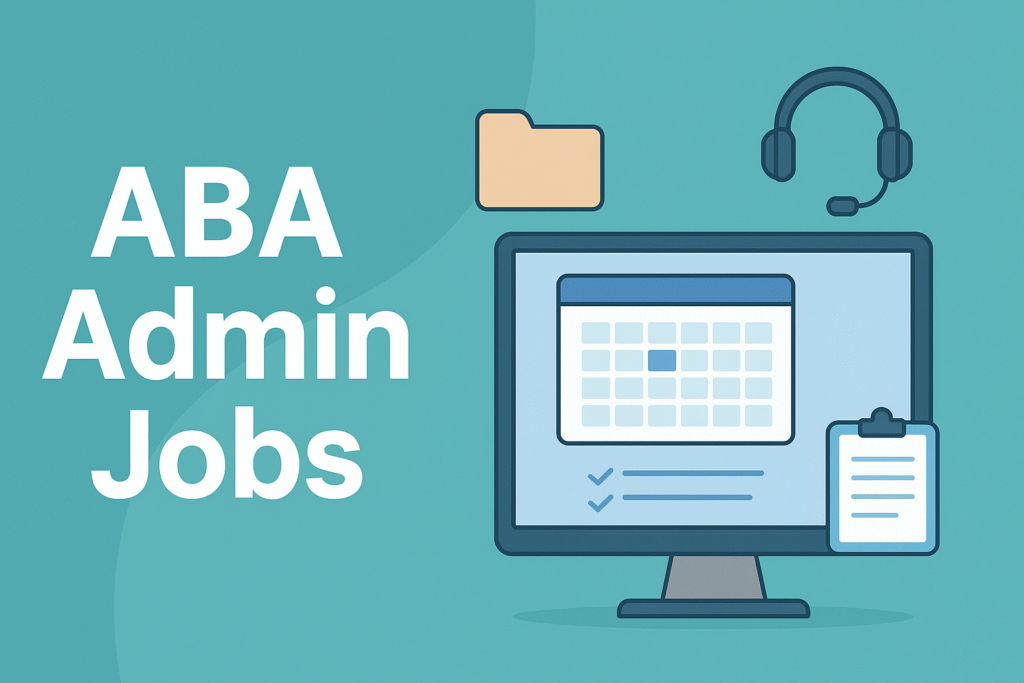When people think about careers in Applied Behavior Analysis (ABA), the first roles that come to mind are usually therapists and Registered Behavior Technicians (RBTs). But behind every successful ABA clinic or practice, there’s an essential team of professionals handling scheduling, records, and client communication. These are ABA admin jobs, and they play a major part in keeping therapy services running smoothly.
Table of Contents

Whether you’re interested in starting a career in behavioral health or want to support ABA services without becoming a direct therapist, ABA admin positions open the door to valuable experience in this growing field.
What Are ABA Admin Jobs?
ABA admin jobs refer to administrative and office-based roles that support therapists, RBTs, and Board Certified Behavior Analysts (BCBAs). While these professionals don’t provide direct therapy, their work ensures that clients, staff, and families have the resources they need for success.
Typical ABA admin roles include:
Administrative assistants for ABA clinics.
Scheduling coordinators who manage client and therapist calendars.
Billing and insurance specialists handling claims and payments.
Front desk staff greeting families and managing paperwork.
Office managers overseeing daily operations.
Why Are ABA Admin Jobs Important?
Applied Behavior Analysis is a structured, data-driven therapy. While therapists focus on client progress, admin staff provide critical support:
Smooth scheduling: Families can easily book consistent therapy sessions.
Accurate records: Admins help maintain detailed data logs and reports.
Insurance support: Billing teams reduce stress for families by handling coverage.
Compliance: Admin staff ensure practices align with BACB requirements.
Without effective administration, ABA therapy could face delays, scheduling conflicts, and paperwork challenges.
Skills Needed for ABA Admin Jobs
If you’re considering applying for an ABA admin job, here are the skills that will set you apart:
Strong communication: Clear, supportive interaction with families and staff.
Organizational skills: Handling schedules, files, and data effectively.
Tech proficiency: Familiarity with electronic health records and scheduling software.
Confidentiality: Respecting client privacy and HIPAA compliance.
Problem solving: Managing last-minute schedule changes or billing issues.
Even though you won’t be delivering therapy, having some knowledge of Applied Behavior Analysis can also make you more effective in supporting therapists.
Entry-Level Opportunities in ABA Admin Jobs
Many people see ABA admin roles as their first step into the behavioral health field. Entry-level positions like receptionists or scheduling assistants often require just a high school diploma or equivalent. Over time, these roles can grow into positions with more responsibility, such as office management or program coordination.
Some ABA practices also encourage admin staff to become RBT-certified, creating a path to direct therapy roles. For those interested, taking a rbt practice exam is a helpful way to prepare.
Career Growth and Pathways
Starting in ABA admin jobs can lead to exciting opportunities:
Transition to RBT: With training and certification, you can move from office support to direct therapy. Try a rbt practice test to see where you stand.
Program coordination: Oversee scheduling, therapy plans, and client onboarding.
Billing specialist: Develop expertise in insurance and medical coding.
Practice management: Lead an ABA clinic or behavioral health office.
These roles give you first-hand exposure to how ABA works, making them a smart career entry point.
Salary Expectations for ABA Admin Jobs
Salaries vary depending on role, location, and experience. On average:
Administrative assistant in ABA: $32,000 – $40,000 annually.
Billing and insurance specialist: $38,000 – $48,000 annually.
Office manager: $45,000 – $55,000 annually.
While not as high-paying as clinical roles, these positions often include benefits like healthcare, flexible hours, and tuition reimbursement for those who want to pursue RBT or BCBA certification later.
FAQs About ABA Admin Jobs What does an ABA administrative assistant do?
They support ABA clinics by scheduling, managing calls, maintaining records, and assisting therapists with documentation.
Do you need a degree for ABA admin jobs?
Not always. Many entry-level admin roles require only a high school diploma, though a background in healthcare administration or psychology can help.
Can ABA admin roles lead to therapy careers?
Yes. Many admin staff transition into RBT positions after gaining exposure to ABA practices. Starting with a rbt mock test is a great way to prepare for certification.
Are ABA admin jobs in demand?
Yes. With the rising need for ABA therapy for autism and developmental conditions, clinics continue to hire admin staff to handle growing caseloads.
How do ABA admin jobs compare to RBT roles?
Admin jobs focus on scheduling, billing, and client support. RBT roles involve direct therapy with clients. Some people choose admin first, then pursue RBT for hands-on experience.
How ABA Admin Jobs Support ABA Practices
ABA therapy is most effective when sessions are consistent and organized. By handling the behind-the-scenes work, admin staff:
Reduce stress for families.
Allow therapists to focus fully on clients.
Ensure compliance with insurance and legal standards.
Help practices scale as demand grows.
It’s not just “office work” it’s an essential role in improving lives through ABA therapy.
Conclusion: Is an ABA Admin Job Right for You?
If you’re interested in the behavioral health field but prefer an administrative path, ABA admin jobs offer rewarding opportunities. They allow you to build valuable skills, support families, and even step into therapy roles later if you choose.
For those considering becoming an RBT, your first step could start here. Begin preparing today with a rbt practice exam and see how far your ABA career can go.
